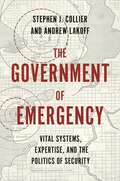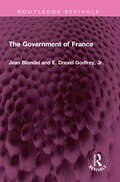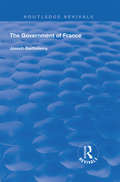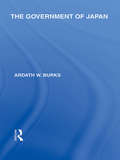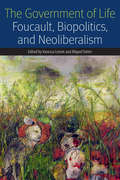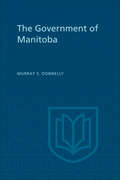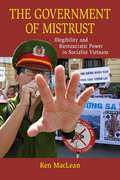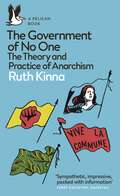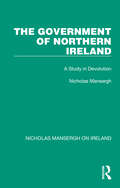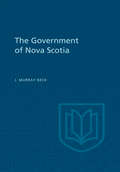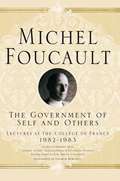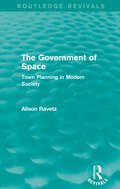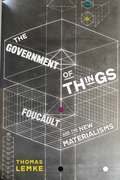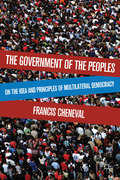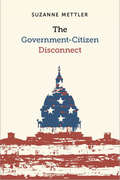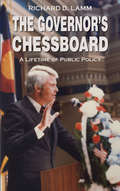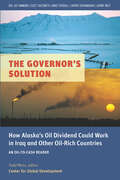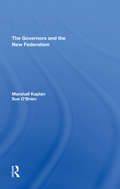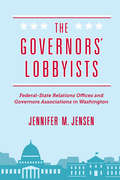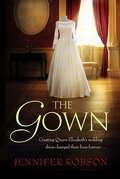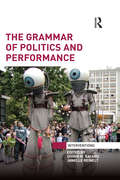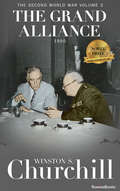- Table View
- List View
The Government of Emergency: Vital Systems, Expertise, and the Politics of Security (Princeton Studies in Culture and Technology #28)
by Stephen J. Collier Andrew LakoffThe origins and development of the modern American emergency stateFrom pandemic disease, to the disasters associated with global warming, to cyberattacks, today we face an increasing array of catastrophic threats. It is striking that, despite the diversity of these threats, experts and officials approach them in common terms: as future events that threaten to disrupt the vital, vulnerable systems upon which modern life depends.The Government of Emergency tells the story of how this now taken-for-granted way of understanding and managing emergencies arose. Amid the Great Depression, World War II, and the Cold War, an array of experts and officials working in obscure government offices developed a new understanding of the nation as a complex of vital, vulnerable systems. They invented technical and administrative devices to mitigate the nation’s vulnerability, and organized a distinctive form of emergency government that would make it possible to prepare for and manage potentially catastrophic events.Through these conceptual and technical inventions, Stephen Collier and Andrew Lakoff argue, vulnerability was defined as a particular kind of problem, one that continues to structure the approach of experts, officials, and policymakers to future emergencies.
The Government of France (Routledge Revivals)
by Jean Blondel E. Drexel Godfrey, Jr.First published in 1968, The Government of France is a guide for students of politics to learn about the eventful history of French democracy and the often startling role of France on the international scene. In conveying information, the authors never fail to relate the structure to the social and economic background, and their commentary is enlivened by amusing asides. By the time he has reached the end of the book the reader will not only have much information on France, but he will also understand how the machinery of government has evolve and in what direction it is likely to move in the future.
The Government of France (Routledge Revivals)
by Joseph BarthelemyOriginally published in 1919. French institutions of today, considered as a whole, form a composite building on which every new regime for the last hundred years has left its mark. The foundation is provided by the social, legal, judicial and administrative system of the Napoleonic Empire, which was crowned in 1875 by the corner-stone of parliamentary democracy. Many other features has been left by other regimes; thus France owes her general principles of common law and her administrative divisions to the Revolution.
The Government of Japan (Routledge Library Editions: Japan)
by Ardath BurksThis book takes a clear look at the course of the economic and political developments in Japan since the Second World War and in particular trends in government and politics since the peace treaty of 1952. It examines the disagreements within the country over re-armament and security; over neutralism versus commitment in the Cold War; over conflicting loyalties to an Asian or a European way of life; and over meeting the rising economic and social expectations of the new middle class.
The Government of Life: Foucault, Biopolitics, and Neoliberalism (Forms of Living)
by Vanessa Lemm and Miguel VatterFoucault’s late work on biopolitics and governmentality has established him as the fundamental thinker of contemporary continental political thought and as a privileged source for our current understanding of neoliberalism and its technologies of power. In this volume, an international and interdisciplinary group of Foucault scholars examines his ideas of biopower and biopolitics and their relation to his project of a history of governmentality and to a theory of the subject found in his last courses at the College de France.Many of the chapters engage critically with the Italian theoretical reception of Foucault. At the same time, the originality of this collection consists in the variety of perspectives and traditions of reception brought to bear upon the problematic connections between biopolitics and governmentality established by Foucault’s last works.
The Government of Manitoba
by Murray DonnellyThis contribution to the Canadian Government series continues the study of provincial government made, with varying approaches, by Frank MacKinnon for Prince Edward Island, Murray Beck for Nova Scotia, and Hugh Thorburn for New Brunswick. Professor Donnelly describes the political institutions of Manitoba, viewing them also in historical perspective and singling out the particular forces that have shaped them. He traces the development of the party system in Canada, its decline under the farmer-dominated Progressive governments of the twenties and under the coalitions that followed, and its resurgence under the Conservative government of Premier Roblin. (Canadian Government Series, No. 14)
The Government of Mistrust
by Ken MacleanFocusing on the creation and misuse of government documents in Vietnam since the 1920s, "The Government of Mistrust" reveals how profoundly the dynamics of bureaucracy have affected Vietnamese efforts to build a socialist society. In examining the flurries of paperwork and directives that moved back and forth between high- and low-level officials, Ken MacLean underscores a paradox: in trying to gather accurate information about the realities of life in rural areas, and thus better govern from Hanoi, the Vietnamese central government employed strategies that actually made the state increasingly illegible to itself. MacLean exposes a falsified world existing largely on paper. As high-level officials attempted to execute centralized planning via decrees, procedures, questionnaires, and audits, low-level officials and peasants used their own strategies to solve local problems. To obtain hoped-for aid from the central government, locals overstated their needs and underreported the resources they actually possessed. Higher-ups attempted to re-establish centralized control and legibility by creating yet more bureaucratic procedures. Amidst the resulting mistrust and ambiguity, many low-level officials were able to engage in strategic action and tactical maneuvering that have shaped socialism in Vietnam in surprising ways.
The Government of No One: The Theory and Practice of Anarchism (Pelican Books)
by Ruth Kinna'The standard book on anarchism for the twenty-first century. Written with brio, quiet insight and clarity' Carl LevyA magisterial study of the history and theory of one of the most controversial political movementsAnarchism routinely gets a bad press. It's usually seen as meaning chaos and disorder -- or even nothing at all. And yet, from Occupy Wall Street to Pussy Riot, Noam Chomsky to David Graeber, this philosophical and political movement is as relevant as ever. Contrary to popular perception, different strands of anarchism -- from individualism to collectivism -- do follow certain structures and a shared sense of purpose: a belief in freedom and working towards collective good without the interference of the state. In this masterful, sympathetic account, political theorist Ruth Kinna traces the tumultuous history of anarchism, starting with thinkers and activists such as Peter Kropotkin and Emma Goldman and through key events like the Paris Commune and the Haymarket affair. Skilfully introducing us to the nuanced theories of anarchist groups from Russia to Japan to the United States, The Government of No One reveals what makes a supposedly chaotic movement particularly adaptable and effective over centuries -- and what we can learn from it.
The Government of Northern Ireland: A Study in Devolution
by Nicholas ManserghOriginally published in 1936, The Government of Northern Ireland examines the practical operation of devolution which was granted to Northern Ireland in 1920. The later phases of the Ulster Question, interacting with a theoretic conception of devolution, provide the historical background in the light of which early 20th Century government in Ireland is analysed. The political, administrative and financial relations between the (then Imperial) and subordinate Parliament, the powers and personnel of the local legislature and the character of the local government are all discussed. The achievement of self-government in Northern Ireland is summarized with special regard to the desirability of a similar grant of devolution to Scotland and Wales.
The Government of Nova Scotia (Canadian Government Series #8)
by James Murray BeckHere is a well-documented study of the structure, historical development, and present condition of the government of Nova Scotia. It deals with one of the oldest constitutions in Canada, one which was not created by statute but by the prerogative of the Crown. Nova Scotia has two major claims to priority in the history of Canadian politics: she was the first province to be granted representative institutions and the first to win responsible government. <P><P>Owing in large measure to Joseph Howe's inspired leadership, the latter was achieved through peaceful, constitutional means. It is obvious that a study of the government of Nova Scotia must dig deep into the past, and Dr. Beck has investigated this early history with great care and thoroughness. This is followed by a study of the more recent period and the working of the government of our own time. <P>The author demonstrates that the important changes, the interesting practices, and the colourful incidents have not all been in the distant past. There was, for example, the Legislative Council, that travesty on democratic institutions which lasted until less than thirty years ago. There was the odd phenomenon of a Liberal government in power for seventy out of ninety years since Confederation. There was the constant need to adapt parliamentary practices and institutions, developed under quite different conditions to the needs of a much smaller community, and one which was keenly aware of its heritage and very jealous of any serious interference.<P>As a native of Nova Scotia and a political scientist, Dr. Beck has had a special interest in seeing how the Nova Scotian institutions of government evolved and how they work today. He has done a great deal of original research among primary sources and covered a field as yet uninvestigated by any other scholar. <P>An admirable addition to the Canadian Government Series, of which it is the eighth volume, this is a book for serious students of political science and for students of Nova Scotia history.
The Government of Self and Others: Lectures at the College de France, 1982-1983
by Michel Foucault Graham Burchell Arnold I. DavidsonAn exciting and highly original examination of the practices of truth-telling and speaking out freely (parr'sia) in ancient Greek tragedy and philosophy. Foucault discusses the difficult and changing practices of truth-telling in ancient democracies and tyrannies and offers a new perspective on the specific relationship of philosophy to politics.
The Government of Space: Town Planning in Modern Society (Routledge Revivals)
by Alison RavetzBritain’s planning system began as ‘town and country planning’ to repair the ravages of unplanned industrialism and promote ideal environments for the future. Steering a course between left and right, public control and for-profit development, it survived successive booms and busts, broadening to include new concerns like ecology, conservation and community participation. By the 1986, when this book was first published, the system’s survival beyond the year 2000 was in doubt. It did endure, but it is now under serious threat from the right, which sees it as obstructing enterprise and the restoration of ‘growth’. It has been stripped of some of its core aims and mechanisms, while as yet there is no agenda distinguishing growth that will be sustainable from growth which self-evidently is not. The Government of Space was written as a concise guide for the non-specialist to the origins and evolution of British planning, its intellectual pedigree, achievements and cruxes. It is an invaluable background to the state of planning and the cases for and against it today.
The Government of Things: Foucault and the New Materialisms
by Thomas LemkeExamines the theoretical achievements and the political impact of the new materialismsMaterialism, a rich philosophical tradition that goes back to antiquity, is currently undergoing a renaissance. In The Government of Things, Thomas Lemke provides a comprehensive overview and critical assessment of this “new materialism”. In analyzing the work of Graham Harman, Jane Bennett, and Karen Barad, Lemke articulates what, exactly, new materialism is and how it has evolved. These insights open up new spaces for critical thought and political experimentation, overcoming the limits of anthropocentrism. Drawing on Michel Foucault’s concept of a “government of things”, the book also goes beyond new materialist scholarship which tends to displace political questions by ethical and aesthetic concerns. It puts forward a relational and performative account of materialities that more closely attends to the interplay of epistemological, ontological, and political issues.Lemke provides definitive and much-needed clarity about the fascinating potential—and limitations—of new materialism as a whole. The Government of Things revisits Foucault’s more-than-human understanding of government to capture a new constellation of power: “environmentality”. As the book demonstrates, contemporary modes of government seek to control the social, ecological, and technological conditions of life rather than directly targeting individuals and populations. The book offers an essential and much needed tool to critically examine this political shift.
The Government of the Peoples
by Francis ChenevalAn exploration of the idea of government of peoples who freely accept liberal democracy and try to realize democracy in their common institutions, the author proposes an integrated 'original position' consisting in a hypothetical agreement of liberal democratic peoples and potentially mobile citizens.
The Government of the Peoples
by Francis ChenevalAn exploration of the idea of government of peoples who freely accept liberal democracy and try to realize democracy in their common institutions, the author proposes an integrated 'original position' consisting in a hypothetical agreement of liberal democratic peoples and potentially mobile citizens.
The Government-Citizen Disconnect
by Suzanne MettlerAmericans’ relationship to the federal government is paradoxical. Polls show that public opinion regarding the government has plummeted to all-time lows, with only one in five saying they trust the government or believe that it operates in their interest. Yet, at the same time, more Americans than ever benefit from some form of government social provision. Political scientist Suzanne Mettler calls this growing gulf between people’s perceptions of government and the actual role it plays in their lives the "government-citizen disconnect." In The Government-Citizen Disconnect, she explores the rise of this phenomenon and its implications for policymaking and politics. Drawing from original survey data which probed Americans’ experiences of 21 federal social policies -- such as food stamps, Social Security, Medicaid, and the home mortgage interest deduction -- Mettler shows that 96 percent of adults have received benefits from at least one of them, and that the average person has utilized five. Overall usage rates transcend social, economic, and political divisions, and most Americans report positive experiences of their policy experiences. However, the fact that they have benefited from these policies has little positive effect on people’s attitudes toward government. Mettler finds that shared identities and group affiliations, as well as ideological forces, are more powerful and consistent influences. In particular, those who oppose welfare tend to extrapolate their unfavorable views of it to government in general. Deep antipathy toward the government has emerged as the result of a conservative movement that has waged a war on social welfare policies for over forty years, even as economic inequality and benefit use have increased. Mettler finds that voting patterns exacerbate the government-citizen disconnect, as those holding positive views of federal programs and supporting expanded benefits have lower rates of political participation than those holding more hostile views of the government. As a result, the loudest political voice belongs to those who have benefited from policies but who give government little credit for their economic well-being, seeing their success more as a matter of their own deservingness. This contributes to the election of politicians who advocate cutting federal social programs. According to Mettler, the government-citizen disconnect frays the bonds of representative government and democracy. The Government-Citizen Disconnect illuminates a paradox that increasingly shapes American politics. Mettler's examination of hostility toward government at a time when most Americans will at some point rely on the social benefits it provides helps us better understand the roots of today's fractious political climate.
The Governor's Chessboard: A Lifetime of Public Policy
by Richard D. LammExploring the life and political career of Governor Richard D. Lamm, The Governor's Chessboard, is an intimate look at a prominent politician, including many of his successes, challenges, and defeats. Politics in America is not a place for boat-rockers, but Governor Lamm successfully made a name for himself by going against the tide of popular opinion. He violated most of the conventional rules of American politics, chiefly by taking on a number of very controversial issues, including abortion rights, civil rights, and immigration. He has always marched to the beat of his own drum, and he continues to do so, well into his eighties.
The Governor's Hounds
by Barry A. Crouch Donaly E. BriceIn the tumultuous years following the Civil War, violence and lawlessness plagued the state of Texas, often overwhelming the ability of local law enforcement to maintain order. In response, Reconstruction-era governor Edmund J. Davis created a state-wide police force that could be mobilized whenever and wherever local authorities were unable or unwilling to control lawlessness. During its three years (1870-1873) of existence, however, the Texas State Police was reviled as an arm of the Radical Republican party and widely condemned for being oppressive, arrogant, staffed with criminals and African Americans, and expensive to maintain, as well as for enforcing the new and unpopular laws that protected the rights of freed slaves. Drawing extensively on the wealth of previously untouched records in the Texas State Archives, as well as other contemporary sources, Barry A. Crouch and Donaly E. Brice here offer the first major objective assessment of the Texas State Police and its role in maintaining law and order in Reconstruction Texas. Examining the activities of the force throughout its tenure and across the state, the authors find that the Texas State Police actually did much to solve the problem of violence in a largely lawless state. While acknowledging that much of the criticism the agency received was merited, the authors make a convincing case that the state police performed many of the same duties that the Texas Rangers later assumed and fulfilled the same need for a mobile, statewide law enforcement agency.
The Governor's Solution: How Alaska's Oil Dividend Could Work in Iraq and Other Oil-Rich Countries
by Todd MossReliance on natural resource revenues, particularly oil, is often associated with bad governance, corruption, and poverty. <P><P>Worried about the effect of oil on Alaska, Governor Jay Hammond had a simple yet revolutionary idea: let citizens have a direct stake. The Governor's Solution features his firsthand account that describes, with brutal honesty and piercing humor, the birth of the Alaska Permanent Fund dividend, which has been paid to each resident every year since 1982.Thirty years later, Hammond's vision is still influencing oil policies throughout the world. This reader, part of the Center for Global Development's Oil-to-Cash initiative, includes recent scholarly work examining Alaska's experience and how other oil-rich societies, particularly Iraq, might apply some of the lessons. It is as a powerful reminder that the combination of new ideas and determined individuals can make a tremendous difference-even in issues as seemingly complex and intractable as fighting the oil curse.
The Governors And The New Federalism
by Marshall Kaplan Sue O'BrienThis book provides an overview of the relationship between Reagan administration initiatives and the US. It presents case studies on the reaction of eight governors to federal health, education, and welfare policies during the 1980s and compares the approaches of each of the studied governors.
The Governors' Lobbyists: Federal-State Relations Offices and Governors Associations in Washington
by Jennifer M. JensenToday, approximately half of all American states have lobbying offices in Washington, DC, where governors are also represented by their own national, partisan, and regional associations. Jennifer M. Jensen's The Governors' Lobbyists draws on quantitative data, archival research, and more than 100 in-depth interviews to detail the political development of this constellation of advocacy organizations since the early 20th century and investigate the current role of the governors' lobbyists in the U.S. federal system. First, Jensen analyzes the critical ways in which state offices and governors' associations promote their interests and, thus, complement other political safeguards of federalism. Next, she considers why, given their apparent power, governors engage lobbyists to serve as advocates and why governors have created both individual state offices and several associations for this advocacy work. Finally, using interest group theory to analyze both material and political costs and benefits, Jensen addresses the question of interest group variation: why, given the fairly clear material benefit a state draws from having a lobbying office in Washington, doesn't every state have one? This assessment of lobbying efforts by state governments and governors reveals much about role and relative power of states within the U.S. federal system.
The Gown: Perfect for fans of The Crown! An enthralling tale of making the Queen's wedding dress
by Jennifer RobsonPerfect for anyone who's captivated by The Crown, The Gown 'will dazzle and delight' (Independent)!The Gown is an enthralling historical novel about one of the most famous wedding dresses of the twentieth century - Queen Elizabeth's wedding gown - and the fascinating women who made it. London, 1947: Besieged by a harsh winter, burdened by shortages and rationing, the people of post-war Britain are suffering despite their nation's recent victory. For Ann Hughes and Miriam Dassin, embroiderers at the famed Mayfair fashion house of Norman Hartnell, a glimmer of brightness comes in the form of their unlikely friendship and being chosen for a once-in-a-lifetime honour: taking part in the creation of Princess Elizabeth's wedding gown. Toronto, 2016: Heather Mackenzie seeks to unravel the mystery of a legacy from her late grandmother. How did her beloved nan, who never spoke of her old life in Britain, come to possess the priceless embroideries that so closely resemble the motifs on the stunning gown worn by Queen Elizabeth II at her wedding almost seventy years before? And what was her nan's connection to the celebrated textile artist and Holocaust survivor Miriam Dassin?With The Gown, Jennifer Robson takes us inside the workrooms where one of the most famous wedding gowns in history was created to tell a story of women whose lives are woven together by the pain of survival, the bonds of friendship, and the redemptive power of love.'Robson succeeds in creating a riveting drama of female friendship, of lives fully lived despite unbearable loss, and of the steadfast effort required to bring forth beauty after surviving war' Independent'A great tale of female friendship' The People's Friend
The Grace Mysteries: Assassin & Betrayal
by Lady Grace CavendishAssassin: One suitor dead with a knife in his back and another under suspicion. . . Can Lady Grace, Queen Elizabeth's favorite Maid of Honor, solve the mystery and bring order back to the Queen's court?Betrayal:Life as a stowaway on board an Elizabethan galleon--it's no place for a lady! But when her fellow Maid of Honor disappears with a dashing sea captain, Lady Grace knows she just has to investigate.From the Trade Paperback edition.
The Grammar of Politics and Performance (Interventions)
by Janelle Reinelt Shirin M RaiThis volume brings together important work at the intersection of politics and performance studies. While the languages of theatre and performance have long been deployed by other disciplines, these are seldom deployed seriously and pursued systematically to discover the actual nature of the relationship between performance as a set of behavioural practices and the forms and the transactions of these other disciplines. This book investigates the structural similarities and features of politics and performance, which are referred to here as ‘grammar’, a concept which also emphasizes the common communicational base or language of these fields. In each of the chapters included in this collection, key processes of both politics and performance are identified and analyzed, demonstrating the critical and indivisible links between the fields. The book also underlines that neither politics nor performance can take place without actors who perform and spectators who receive, evaluate and react to these actions. At the heart of the project is the ambition to bring about a paradigm change, such that politics cannot be analyzed seriously without a sophisticated understanding of its performance. All the chapters here display a concrete set of events, practices, and contexts within which politics and performance are inseparable elements. This work will be of great interest to students and scholars in both International Relations and Performance Studies.
The Grand Alliance: The Second World War, Volume 3 (Winston S. Churchill The Second World Wa #3)
by Winston S. ChurchillThe British, Soviets, and Americans unite in this chapter of the six-volume WWII history by the legendary prime minister and Nobel Prize recipient. The Grand Alliance describes the end of an extraordinary period in British military history, in which Britain stood alone against Germany. Two crucial events brought an end to Britain&’s isolation. First was Hitler&’s decision to attack the Soviet Union, opening up a battle front in the East and forcing Stalin to look to the British for support. The second was the bombing of Pearl Harbor. US support had long been crucial to the British war effort, and here, Winston Churchill documents his efforts to draw the Americans to aid, including correspondence with President Roosevelt. This book is part of the six-volume account of World War II told from the unique viewpoint of a British prime minister who led his nation in the fight against tyranny. In addition to the correspondence with FDR, the series is enriched with extensive primary sources. We are presented with not only Churchill&’s retrospective analysis of the war, but also memos, letters, orders, speeches, and telegrams, day-by-day accounts of reactions as the drama intensifies. Throughout these volumes, we listen as strategies and counterstrategies unfold in response to Hitler&’s conquest of Europe, planned invasion of England, and assault on Russia, in a mesmerizing account of the crucial decisions made as the fate of the world hangs in the balance. &“A masterly piece of historical writing . . . complete with humor and wit.&” —The New Yorker
